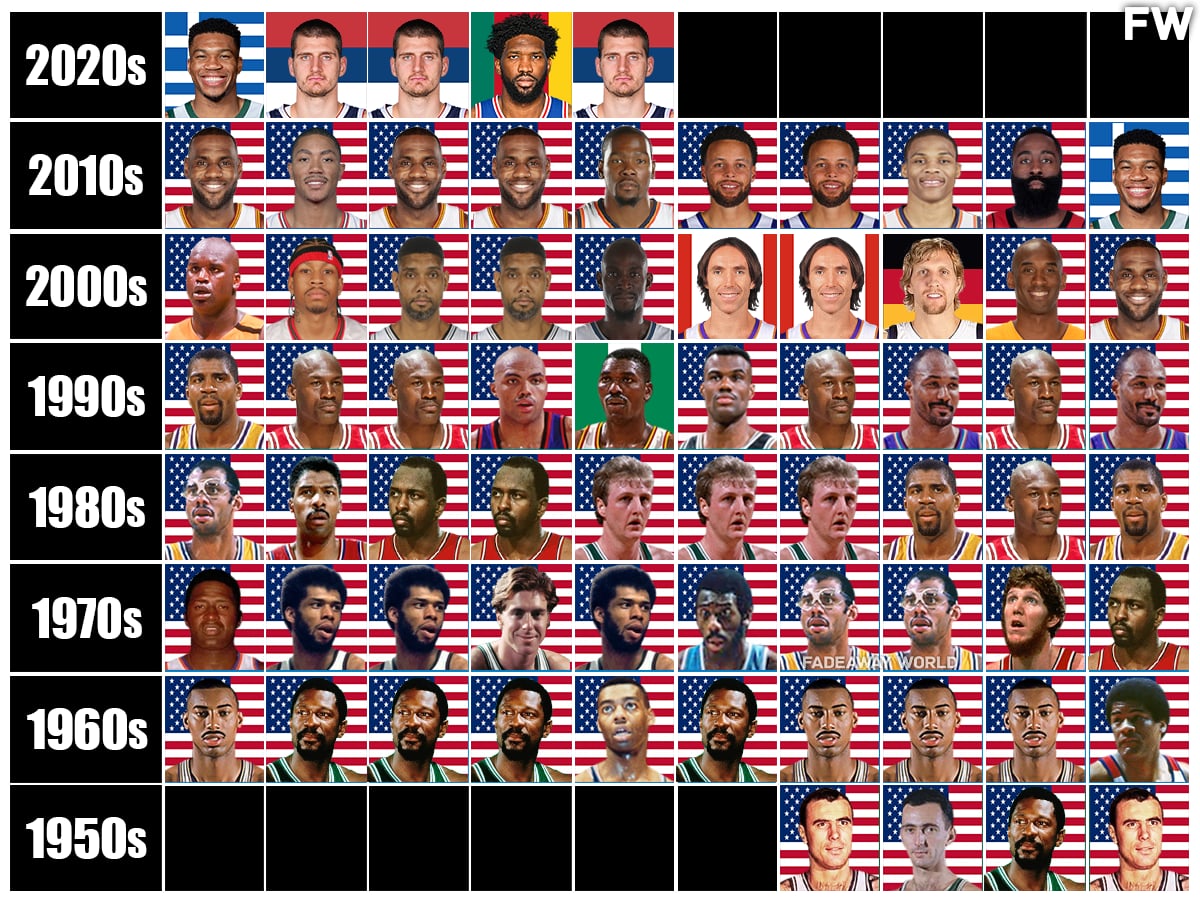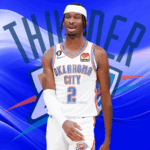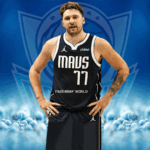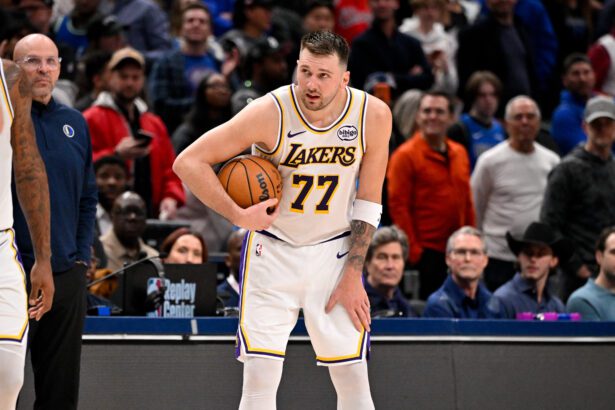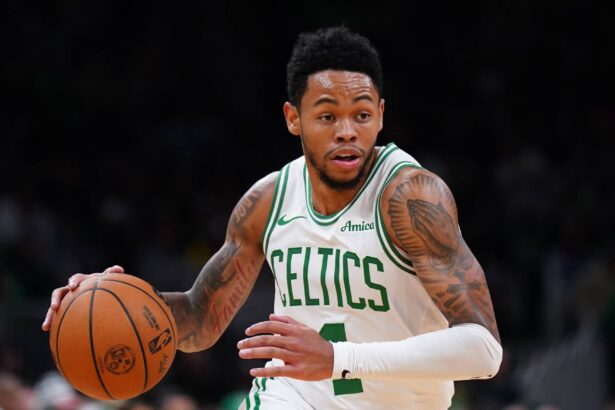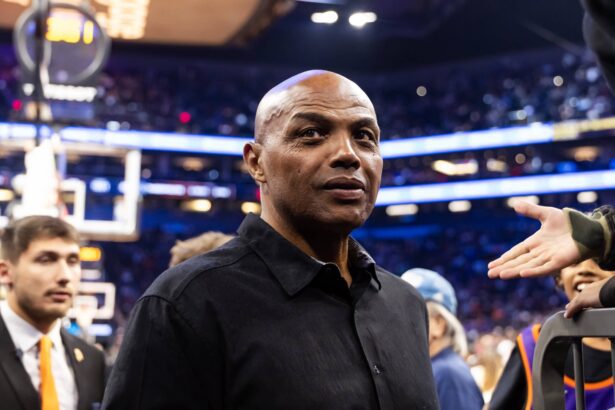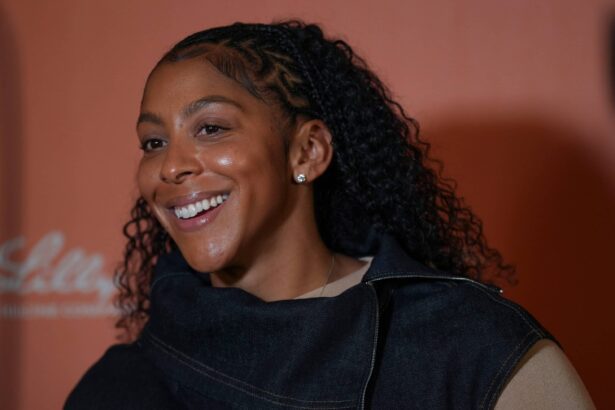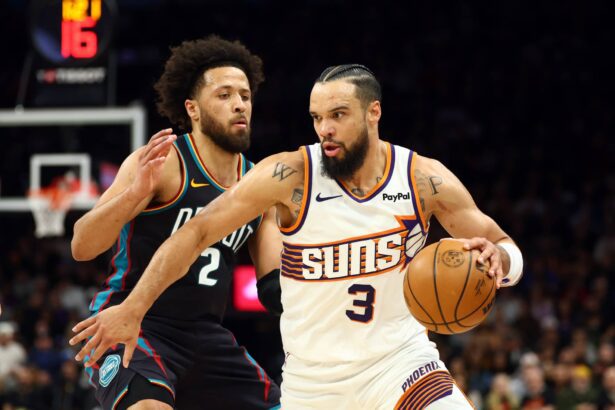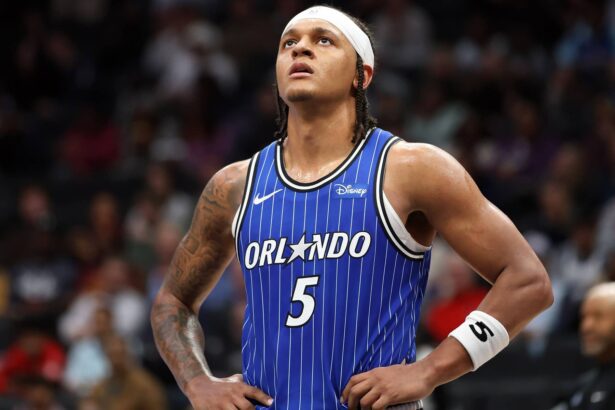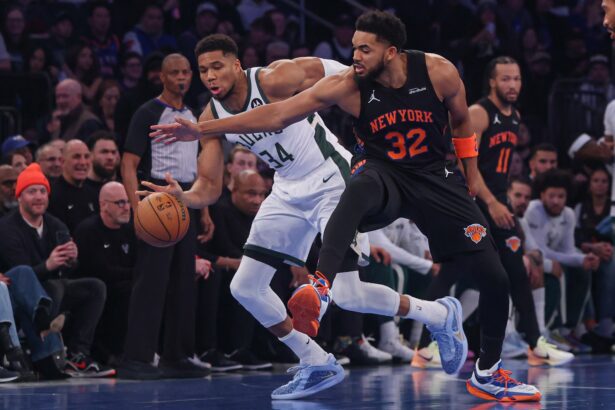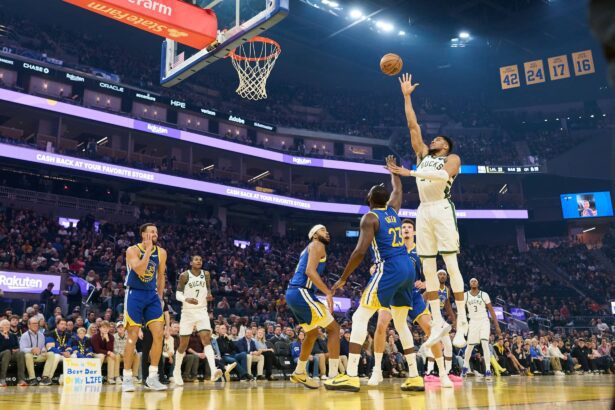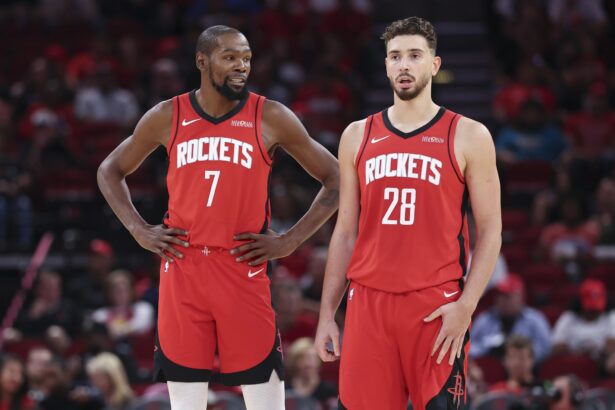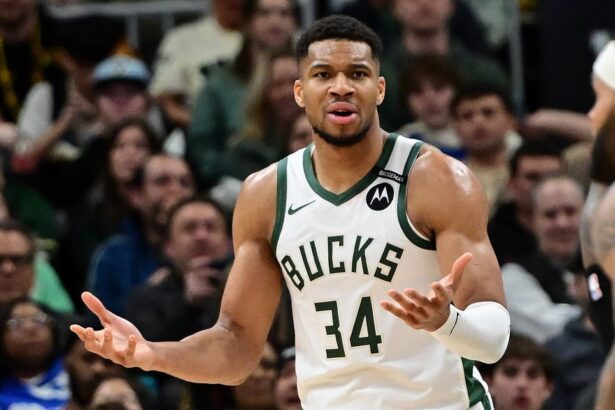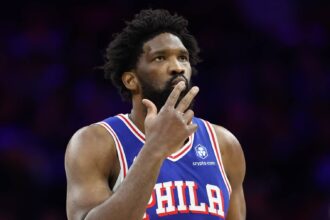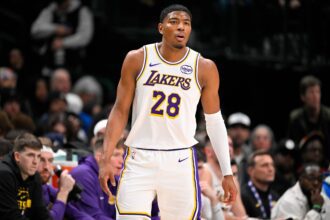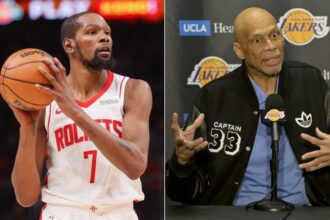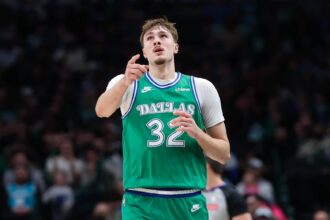Best-selling author and former San Antonio Spurs VP of strategic research Kirk Goldsbery posted a very interesting story on his Instagram that showed all the MVP winners’ nationalities per decade. To uncover this idea, we have collected all the MVP winners by decade and run through the fact that there have only been six international players (excluding Tim Duncan, who is from the U.S. Virgin Islands) to ever win the MVP award. Each decade between the 1950s and 2020s has yielded superstar players, so let’s see the American players’ dominance in the NBA when it came to capturing the MVP.
1950s Decade
1956 MVP Winner – Bob Pettit (USA)
1957 MVP Winner – Bob Cousy (USA)
1958 MVP Winner – Bill Russell (USA)
1959 MVP Winner – Bob Pettit (USA)
In the beginning stages of NBA history, the 1950s witnessed American players like Bob Pettit, Bob Cousy, and Bill Russell showcase their extraordinary talents. Bob Pettit, a dominant force in the 1950s, won his first MVP award in 1956. He led the league in scoring and rebounding, averaging 25.7 points and 16.2 rebounds per game.
Bob Cousy then claimed the MVP title in 1957. He guided the Boston Celtics to an NBA championship while averaging 20.6 points and 7.5 assists per game. Bill Russell, a defensive stalwart and a key figure in the Celtics dynasty, earned his first MVP award in 1958. He anchored the Celtics’ defense with remarkable shot-blocking and rebounding, averaging 22.7 rebounds per game.
To cap off the 1950s, Bob Pettit secured his second MVP honor in 1959, reaffirming his status as one of the decade’s premier players. He continued to dominate both ends of the court, averaging 29.2 points and 16.4 rebounds per game.
1960s Decade
1960 MVP Winner – Wilt Chamberlain (USA)
1961 MVP Winner – Bill Russell (USA)
1962 MVP Winner – Bill Russell (USA)
1963 MVP Winner – Bill Russell (USA)
1964 MVP Winner – Oscar Robertson (USA)
1965 MVP Winner – Bill Russell (USA)
1966 MVP Winner – Wilt Chamberlain (USA)
1967 MVP Winner – Wilt Chamberlain (USA)
1968 MVP Winner – Wilt Chamberlain (USA)
1969 MVP Winner – Wes Unseld (USA)
Wilt Chamberlain, a dominant force in the paint, claimed the MVP award in 1960. He set numerous scoring and rebounding records, including averaging 37.6 points and 27.0 rebounds per game in his rookie season. It wouldn’t be the last time Wilt would win the MVP, as he accomplished the feat three more times in the decade, capturing three in a row starting in 1966.
Bill Russell, renowned for his defensive prowess and leadership, secured the MVP title in 1961. He guided the Boston Celtics to another championship while anchoring their defense with 23.9 rebounds per game. He also managed three in a row in 1962 and 1963, as Russell led the Celtics to two more championships.
The only two players in the 1960s to win the MVP were Oscar Robertson and Wes Unseld. Robertson, known for his versatile skills and triple-double prowess, became the first player in NBA history to average a triple-double for an entire season in 1964, with 31.4 points, 11.0 assists, and 9.9 rebounds per game.
Meanwhile, Wes Unseld, a rookie sensation, captured the MVP award in 1969, making an immediate impact with his exceptional rebounding and defensive skills. He averaged 18.2 rebounds per game, showcasing his versatility and impact on both ends of the court as he won the Rookie of the Year as well.
1970s Decade
1970 MVP Winner – Willis Reed (USA)
1971 MVP Winner – Kareem Abdul-Jabbar (USA)
1972 MVP Winner – Kareem Abdul-Jabbar (USA)
1973 MVP Winner – Dave Cowens (USA)
1974 MVP Winner – Kareem Abdul-Jabbar (USA)
1975 MVP Winner – Bob McAdoo (USA)
1976 MVP Winner – Kareem Abdul-Jabbar (USA)
1977 MVP Winner – Kareem Abdul-Jabbar (USA)
1978 MVP Winner – Bill Walton (USA)
1979 MVP Winner – Moses Malone (USA)
Willis Reed, a cornerstone of the New York Knicks championship team, earned the MVP award in 1970. His leadership and defensive presence were pivotal in guiding the Knicks to their first NBA title. It then became Kareem Abdul-Jabbar’s league. Kareem, known for his unstoppable skyhook and dominance in the paint, claimed the MVP title in 1971. He led the Milwaukee Bucks to an NBA championship while averaging 31.7 points and 16.0 rebounds per game.
Abdul-Jabbar secured his second consecutive MVP award in 1972, showcasing his scoring prowess and defensive impact. He continued to dominate the league with his patented skyhook and averaged 34.8 points and 16.6 rebounds per game.
Dave Cowens, a tenacious and versatile big man for the Boston Celtics, captured the MVP award in 1973. His relentless energy and all-around skills propelled the Celtics to 68 wins, averaging 20.5 points and 16.2 rebounds per game.
Kareem Abdul-Jabbar reclaimed the MVP honor in 1974, reaffirming his status as one of the era’s most dominant players. His scoring prowess and defensive presence were unmatched, averaging 27.0 points and 14.5 rebounds per game.
Bob McAdoo, a scoring machine for the Buffalo Braves, earned the MVP award in 1975. His offensive firepower and rebounding prowess were instrumental in leading the Braves to success, averaging 34.5 points and 14.1 rebounds per game while winning the second of his three straight scoring titles.
Kareem Abdul-Jabbar secured his fourth MVP award in 1976, continuing to dominate the league with his scoring and shot-blocking abilities, and won another one in 1977 by posting 26.2 points per game while also contributing 13.3 rebounds and 3.2 blocks per game.
Bill Walton, a dominant center for the Portland Trail Blazers, captured the MVP award in 1978. His exceptional passing, shot-blocking, and rebounding skills were pivotal in leading the Blazers to an NBA championship the year prior but earned his MVP regardless.
Moses Malone, a dominant force in the paint, earned the MVP award in 1979. His relentless rebounding and scoring ability propelled the Houston Rockets to 47 wins, averaging 24.8 points and a league-leading 17.6 rebounds per game.
1980s Decade
1980 MVP Winner – Kareem Abdul-Jabbar (USA)
1981 MVP Winner – Julius Erving (USA)
1982 MVP Winner – Moses Malone (USA)
1983 MVP Winner – Moses Malone (USA)
1984 MVP Winner – Larry Bird (USA)
1985 MVP Winner – Larry Bird (USA)
1986 MVP Winner – Larry Bird (USA)
1987 MVP Winner – Magic Johnson (USA)
1988 MVP Winner – Michael Jordan (USA)
1989 MVP Winner – Magic Johnson (USA)
Kareem Abdul-Jabbar secured the MVP award in 1980, continuing his dominance in the league. He averaged 24.8 points per game, while also contributing 10.8 rebounds and 4.5 assists per game. Abdul-Jabbar played a pivotal role in leading the Los Angeles Lakers to the NBA Finals, ultimately winning the NBA title.
Julius Erving claimed the MVP honor in 1981, posting 24.6 points, 8.0 rebounds, and 4.4 assists per game while leading the Philadelphia 76ers to the Eastern Conference Finals. Erving’s highlight-reel dunks and all-around brilliance made him one of the most electrifying players of his era.
Moses Malone, a dominant force in the paint, earned MVP honors in 1982 and 1983, dominating with his relentless play. In 1982, Malone led the league in both scoring (31.1 points per game) and rebounding (14.7 rebounds per game) while anchoring the Houston Rockets’ frontcourt. The following season, Malone’s tenacity and work ethic propelled the 76ers in his first season with the team to the NBA Finals and an NBA championship in 1983.
Larry Bird emerged as a dominant force, winning MVP awards in 1984, 1985, and 1986, solidifying his status as one of the greatest players of his era. In 1984, Bird averaged 24.2 points, 10.1 rebounds, and 6.6 assists per game while leading the Boston Celtics to an NBA-best 62-20 record and an NBA title.
Bird retained his MVP status in 1985, showcasing his exceptional skills and leadership on the court. He averaged 28.7 points, 10.5 rebounds, and 6.6 assists per game while guiding the Celtics to the NBA Finals in a losing effort. Bird secured his third consecutive MVP award in 1986, continuing to elevate the Boston Celtics with his remarkable play. He averaged 25.8 points, 9.8 rebounds, and 6.8 assists per game while leading the Celtics to another NBA championship.
Legendary point guard Magic Johnson displayed his exceptional skill set and leadership, capturing the MVP title in 1987 and 1989. In 1987, he averaged 23.9 points, 12.2 assists, and 6.3 rebounds per game while leading the Los Angeles Lakers to an NBA-best 65-17 record. In 1989, he averaged 22.5 points, 12.8 assists, and 7.9 rebounds per game while leading the Lakers to the NBA Finals, where they fell short against the Detroit Pistons.
Michael Jordan, a transcendent talent, claimed his first MVP award in 1988, signaling the beginning of his legendary career in what could be one of the greatest individual seasons ever. Jordan averaged 35.0 points, 5.5 rebounds, 5.9 assists, and 3.2 steals per game while establishing himself as the most electrifying player in the league by winning Defensive Player of the Year and the scoring title.
1990s Decade
1990 MVP Winner – Magic Johnson (USA)
1991 MVP Winner – Michael Jordan (USA)
1992 MVP Winner – Michael Jordan (USA)
1993 MVP Winner – Charles Barkley (USA)
1994 MVP Winner – Hakeem Olajuwon (Nigeria)
1995 MVP Winner – David Robinson (USA)
1996 MVP Winner – Michael Jordan (USA)
1997 MVP Winner – Karl Malone (USA)
1998 MVP Winner – Michael Jordan (USA)
1999 MVP Winner – Karl Malone (USA)
Still the best point guard in the world, Magic Johnson showcased his exceptional leadership and skill set, averaging 22.3 points, 11.5 assists, and 6.6 rebounds per game, leading the Los Angeles Lakers to the second round of the playoffs.
Michael Jordan started his path as the greatest basketball player of all time and claimed the MVP title in 1991. He led the league in scoring with 31.5 points per game, guiding the Chicago Bulls to their first NBA championship. Jordan retained the MVP honor in 1992, continuing his dominance with the Chicago Bulls. He averaged 30.1 points, 6.4 rebounds, and 6.1 assists per game, leading the Bulls to their second consecutive NBA championship.
Charles Barkley, known for his tenacity and versatility, earned the MVP award in 1993. He led posted 12.2 rebounds per game to go along with 25.6 points and 5.1 assists per game for the Phoenix Suns. Barkley led the team to the Finals but fell short to Jordan’s Bulls.
Hakeem Olajuwon, a defensive stalwart and offensive powerhouse, claimed the MVP title in 1994. He guided the Houston Rockets to an NBA championship, averaging 27.3 points, 11.9 rebounds, and 3.7 blocks per game.
David Robinson secured the MVP award in 1995. He posted 27.6 points per game and also averaged 10.8 rebounds and 3.2 blocks per game while leading the San Antonio Spurs to the Western Conference Finals.
Not to be outdone, Michael Jordan reclaimed the MVP award in 1996, showcasing his unparalleled scoring and defensive prowess. He led the league in scoring with 30.4 points per game and guided the Bulls to an NBA-record 72 regular-season wins. He managed his fifth MVP trophy in 1998 when led the league in scoring with 28.7 points per game and guided the Bulls to their sixth NBA championship.
Karl Malone won two MVPs in the 1990s. He averaged 27.4 points per game, 9.9 rebounds, and 4.5 assists per game for the Utah Jazz in the 1997 season and reclaimed the MVP title in 1999, showcasing his consistency and dominance on both ends of the court. He averaged 23.8 points, 9.4 rebounds, and 4.1 assists per game for the Utah Jazz, leading them to the NBA Finals.
2000s Decade
2000 MVP Winner – Shaquille O’Neal (USA)
2001 MVP Winner – Allen Iverson (USA)
2002 MVP Winner – Tim Duncan (USA)
2003 MVP Winner – Tim Duncan (USA)
2004 MVP Winner – Kevin Garnett (USA)
2005 MVP Winner – Steve Nash (Canada)
2006 MVP Winner – Steve Nash (Canada)
2007 MVP Winner – Dirk Nowitzki (Germany)
2008 MVP Winner – Kobe Bryant (USA)
2009 MVP Winner – LeBron James (USA)
The undisputed most dominant big man since Wilt Chamberlain, Shaquille O’Neal was the unquestioned best player in the league in the year 2000. There was no answer for him, and he usually fouled out most defenders on most nights. Shaq was extremely dominant on both ends of the floor, posting ridiculous numbers of 29.7 PPG, 13.6 RPG, 3.8 APG, and 3.0 BPG.
Allen Iverson’s MVP season was legendary, as he was responsible for carrying a Sixers team all season long. Iverson was simply unguardable, and he used his speed and quickness to his advantage when it came to beating defenders off the dribble. Iverson is quite possibly the greatest player ever, pound for pound and he proved it in 2001 by posting 31.1 PPG, 4.6 APG, and 2.5 SPG. Making the NBA Finals with 35-year-old Dikembe Mutombo as his best teammate was probably his biggest achievement in the postseason as well.
Duncan won two MVP Awards as part of the Spurs, and he was well-deserving of each. He was the main piece to the Spurs’ big 3, and everything ran through Duncan on both ends of the floor. Of course, the Spurs won a ton of games almost every year and Duncan’s impact was the main reason why. The greatest power forward ever, The Big Fundamental, probably deserved more than the two MVP trophies he won in 2002 and 2003, although he played in a league that had a prime Shaquille O’Neal, Kevin Garnett, and Steve Nash, which took away his votes every year.
The Big Ticket himself, KG was by far the most valuable player to his team in 2003-04, as he was literally doing everything for the Wolves. His leadership, passing ability, scoring, and defense were just a step above most players in the league. He managed to lead a poor Wolves team into the playoffs after securing an impressive 58-24 record, which led the West. It is hard to argue against Garnett being the greatest player in Timberwolves history, either.
While Steve Nash certainly deserves an MVP Award for his spectacular floor leadership and offensive dominance, a second MVP Award is very debatable. Many claim he stole an MVP from Kobe Bryant, although Nash does have an argument, considering how dominant he made the Suns and was one of the few international players to win an MVP award in his era.
Dirk was a monster in 2007, thanks to his ability to score from anywhere on the court. His shooting was sublime and was one of the few bigs who could actually spread the floor. He led the Mavs to a very strong record at 60-22, although he fell short in the NBA Finals. Still, averaging 24.6 PPG on 50-40-90 splits as a power forward was incredibly impressive.
Kobe Bryant finally won an MVP Award after falling short a few times in the mid-2000s. Bryant had one of the most spectacular offensive seasons in history just two years prior, putting up ridiculous point totals all season long, including an 81-point game. But it took Bryant getting the help he needed in Pau Gasol before he led the Lakers to the best record in the West in 2008.
As possibly the greatest regular-season performer in NBA history, James managed two back-to-back MVP seasons in which he managed to win two championships as well. His first came in the 2009 season when he averaged 28.4 points, 7.6 rebounds, and 7.2 assists per game with the Cleveland Cavaliers.
2010s Decade
2010 MVP Winner – LeBron James (USA)
2011 MVP Winner – Derrick Rose (USA)
2012 MVP Winner – LeBron James (USA)
2013 MVP Winner – LeBron James (USA)
2014 MVP Winner – Kevin Durant (USA)
2015 MVP Winner – Stephen Curry (USA)
2016 MVP Winner – Stephen Curry (USA)
2017 MVP Winner – Russell Westbrook (USA)
2018 MVP Winner – James Harden (USA)
2019 MVP Winner – Giannis Antetokounmpo (Greece)
LeBron James is simply the most unstoppable physical athlete we have ever seen, in terms of overall ability. He was quick, strong, and explosive, and could not be stopped. Especially when he played for the Miami Heat, James was one of the most dominant MVP winners of all time because he was a walking triple-double threat and elite defender.
Derrick Rose was an absolute monster in his prime and was completely unguardable in his MVP season. He was so dominant, that he managed to win the MVP over LeBron James. Rose will go down as one of the greatest what-ifs in NBA history, and his MVP season will forever be etched in fans’ memories because he carried the Chicago Bulls to the best record in the league.
Kevin Durant was the last small forward to win the award, and he did it as a member of the Oklahoma City Thunder. As good as his running buddy Russel Westbrook was, Durant was on another level in 2013-2014. He was the best scorer in the league and showed an overall game, including defense and playmaking, all year. Posting a league-leading 32.0 PPG on 50.3% shooting from the field, KD was the best player in the world in 2014.
Stephen Curry is a four-time NBA champion and two-time MVP. He even managed to win a very deserving unanimous MVP Award following one of the most legendary regular-season performances in NBA history. Curry’s MVP seasons were the reason why the NBA has changed so much, and Curry gets all the credit for directing the next generation of players.
Russell Westbrook was thrust into the alpha role after Kevin Durant left him for the Warriors. Westbrook grasped that role and put up a historic triple-double season en route to his first MVP Award. Russ is the new king of the triple-double, taking over from legendary Oscar Robertson, and his MVP season was one to remember. Capping off the season with a game-winner almost ensured Russ was going to be the next point guard to win MVP.
The Beard was the last MVP winner at the shooting guard spot, and he probably deserved the award one year prior, considering his elite numbers. Looking at his impact, production, and numbers, The Beard earned at least one award as a member of the Houston Rockets. Harden completely took over the league all season long, and he could not be stopped no matter who was defending him, posting averages of 30.4 PPG and 8.8 APG.
The NBA’s most recent MVP winner from the power forward spot, Giannis has been on a crash course to becoming the best player in the world. So far, he has reached that level and managed to win back-to-back MVPs in 2019 and 2020. By the age of 29, Giannis already had two MVP trophies in his name and an NBA title, as well.
2020s Decade
2020 MVP Winner – Giannis Antetokounmpo (Greece)
2021 MVP Winner – Nikola Jokic (Serbia)
2022 MVP Winner – Nikola Jokic (Serbia)
2023 MVP Winner – Joel Embiid (Cameroon)
2024 MVP Winner – Nikola Jokic (Serbia)
After Giannis Antetokounmpo’s 2020 MVP season when he averaged 29.5 points, 13.6 rebounds, and 5.6 assists per game on 55.3% from the field, the 2020s were dominated by Nikola Jokic. The Serbian has completely dominated the game with the Denver Nuggets, capturing three MVP awards in four seasons. He posted 26.4 points, 10.8 rebounds, and 8.3 assists per game in 2021, followed by averages of 27.1 points, 13.8 rebounds, and 7.9 assists per game in 2022.
Only Joel Embiid was able to stop Jokic’s MVP run, posting 33.1 points, 10.2 rebounds, and 4.2 assists per game in the 2022-23 season. Winning the scoring title, Embiid was the deserving MVP award winner but it would be the following season when Jokic would capture his third award after averaging 26.4 points, 12.4 rebounds, and 9.0 assists per game as the mountain from Serbia.
Thank you for being a valued reader of Fadeaway World. If you liked this article, please consider following us on Google News. We really appreciate your support.

